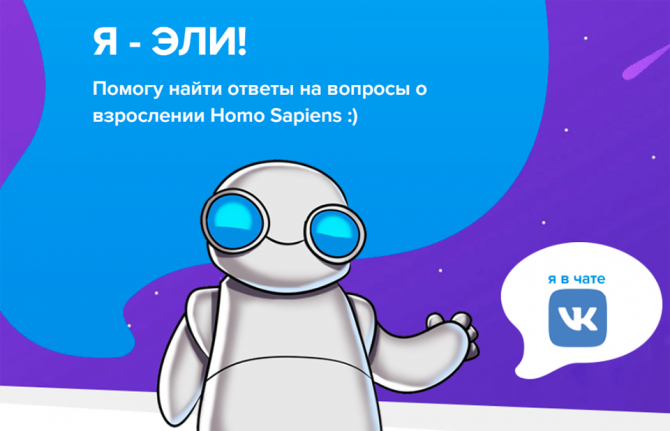

Feature Story
Chatbot answers young people’s questions about HIV, health and relationships
15 October 2020
15 October 2020 15 October 2020A chatbot named Eli that can answer questions about growing up, love, relationships and sexual health, including HIV prevention and treatment, has been launched on the VKontakte social network, adding to the resources for health available to young people in eastern Europe and central Asia.
Created by the United Nations Educational, Scientific and Cultural Organization (UNESCO) Institute for Information Technologies in Education (IITE), Eli answers questions on six topics—psychology, physiology, sex, relationships, family and health. The knowledge base was created by an editorial team in collaboration with health workers and psychologists using materials on, for example, sexual and reproductive health, psychological well-being and HIV prevention, testing and treatment from UNESCO, UNAIDS and other United Nations agencies.
A large proportion of Eli’s knowledge base is on HIV prevention, testing and treatment. In a dialogue with a user, Eli explains why young people who have sex may need to be tested for HIV, what kind of tests are available, where and how they can be done and why it is crucial to start antiretroviral therapy immediately if the test results show that the person is HIV-positive. Eli helps to overcome fears and concerns and motivates its users to seek medical help.
“The use of modern innovative information technologies is an indispensable element of successful HIV education and prevention among young people, and UNESCO remains the leader in this area,” said Alexander Goliusov, Director, a.i., of the UNAIDS Regional Support Team for Eastern Europe and Central Asia.
Machine learning technologies were used to create the chatbot. Users can ask Eli a question of their own or choose one of the suggested questions. Artificial intelligence powers the response, taking into account possible connections—for example, when talking about sexually transmitted infections, Eli will give information about symptoms and diagnostic methods and will also tell the user what to do if his or her partner does not want to use protection.
Eli’s language combines expertise and respect for the user and its speech is as gender neutral as possible and free from stigma.
“Eli is an irreplaceable assistant for those who are growing up and discovering new feelings and relationships and who often need truthful information without edification and stereotypes. Eli is another step in implementing UNESCO's global strategy to empower girls and boys to increase their health literacy and to build and maintain healthy, respectful and rewarding relationships,” said Tigran Yepoyan, Head of ICT and Health Education at UNESCO IITE.
In the first week after its launch, more than 4000 people subscribed to the Eli VKontakte group and Eli answered more than 150 000 questions from 10 000 users. People also shared their feedback: “Cool and important topic!” “Eli learns and shares it with us! Go for it, Bot!” “This is very cool guys!” “I would like to thank the creators of this project. You are doing great!”
Eli is available right now and instructions are available for those who have never used such a service.
Eli will serve as a prototype for the creation of similar chatbots in Russian and in the national languages of Kazakhstan and Kyrgyzstan this year and in the languages of other countries in eastern Europe and central Asia in the future.
Our work
Additional information
Region/country
- Eastern Europe and Central Asia
- Albania
- Armenia
- Azerbaijan
- Belarus
- Bosnia and Herzegovina
- Bulgaria
- Croatia
- Cyprus
- Czechia
- Estonia
- Georgia
- Hungary
- Kazakhstan
- Kyrgyzstan
- Latvia
- Lithuania
- Montenegro
- Poland
- Republic of Moldova
- Romania
- Russian Federation
- Serbia
- Slovakia
- Slovenia
- Tajikistan
- North Macedonia
- Türkiye
- Turkmenistan
- Ukraine
- Uzbekistan



